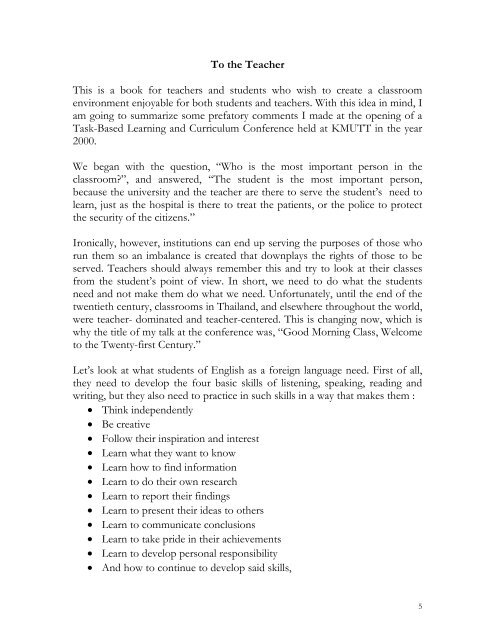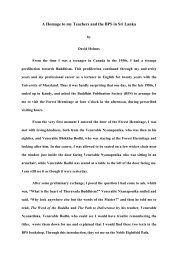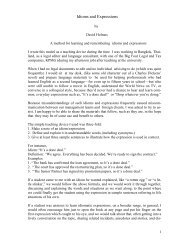- Page 1 and 2: Speaking Activities for the Classro
- Page 3: Preface The materials in this text
- Page 7 and 8: The sad thing about our conference
- Page 9 and 10: Introductions Since this is a speak
- Page 11 and 12: Remembering Introductions Another w
- Page 13 and 14: Ball Game This game came from the g
- Page 15 and 16: Simon Says ... This is a game that
- Page 17 and 18: I Spy with my Little Eye... This is
- Page 19 and 20: Hangman This is another children’
- Page 21 and 22: It’s in the Bag Find a durable pl
- Page 23 and 24: Here’s a Variation on the Getting
- Page 25 and 26: Twenty Questions Think of a word th
- Page 27 and 28: The One-Minute Game This game has t
- Page 29 and 30: Drawing a Pie Chart to Tell About Y
- Page 31 and 32: Get the Class to Make-up a Story .
- Page 33 and 34: Find Someone Who... Has never been
- Page 35 and 36: Find Someone Who... Ate steak last
- Page 37 and 38: Find Someone Who... Is learning Jap
- Page 39 and 40: More Detective Work Another way to
- Page 41 and 42: Using Word Suggestion to Tell a Sto
- Page 43 and 44: “I am thinking of something that
- Page 45 and 46: Find Someone Who... Has three older
- Page 47 and 48: Find Someone Who Would Like to... B
- Page 49 and 50: More Words to Whisper and Remember
- Page 51 and 52: Draw an Object and Name the Parts D
- Page 53 and 54: The Numbers Game Everybody must thi
- Page 55 and 56:
What Talents Do We Have in Our Grou
- Page 57 and 58:
Alone on a Desert Island Imagine th
- Page 59 and 60:
Thinking of Related-Words Divide th
- Page 61 and 62:
Chapter Two : Words, Phrases and Se
- Page 63 and 64:
Obeying the Law Get the students to
- Page 65 and 66:
More Noises What noises do you asso
- Page 67 and 68:
Similar and Related Words Get four
- Page 69 and 70:
Are You a Fruit? Everyone in the cl
- Page 71 and 72:
Draw Pictures and Guess the Words T
- Page 73 and 74:
Write Sentences for These Words Fin
- Page 75 and 76:
Colors and Associations In western
- Page 77 and 78:
Who Can Think of The Most Words wit
- Page 79 and 80:
Hints for Guessing Words Put the st
- Page 81 and 82:
Concordance When we make a mistake,
- Page 83 and 84:
Things That You’re Required to Do
- Page 85 and 86:
Which Worse and Why? Another variat
- Page 87 and 88:
Comparing People to Animals In the
- Page 89 and 90:
Talking About the Old and the Young
- Page 91 and 92:
Sign Language Using Gestures Learn
- Page 93 and 94:
Which Word Doesn’t Fit In? Below
- Page 95 and 96:
Job Descriptions Below are the name
- Page 97 and 98:
Write out Words Related to... Divid
- Page 99 and 100:
The Last Letter of the Last Word Si
- Page 101 and 102:
Do You Have a Problem? What is Your
- Page 103 and 104:
Tell Us Some Things That You Dislik
- Page 105 and 106:
What Do Teachers and Bosses Like? T
- Page 107 and 108:
Making Toys from Trash In many area
- Page 109 and 110:
How to Build an Igloo* Divide the c
- Page 111 and 112:
Chapter Three : Grammar Tasks and S
- Page 113 and 114:
Irregular Plural Nouns Read out the
- Page 115 and 116:
Insert the Appropriate Verb Forms F
- Page 117 and 118:
What Do You Think? This is a questi
- Page 119 and 120:
How Long Have You Been A Student He
- Page 121 and 122:
Have You Ever...? If someone asks y
- Page 123 and 124:
What Did You Used to Do When You Wh
- Page 125 and 126:
What Would You Do If...? There are
- Page 127 and 128:
Using the Relative Pronouns: Who, T
- Page 129 and 130:
Some and Any, Somebody, Anybody, So
- Page 131 and 132:
Practicing Question Tags Look at th
- Page 133 and 134:
Chapter Four : Interactive Role-Pla
- Page 135 and 136:
Some Easy Chit-chat If you could gi
- Page 137 and 138:
Telephone Role Play Telephone and d
- Page 139 and 140:
Making an Appointment with the Psyc
- Page 141 and 142:
Write the Dialogue for a Telephone
- Page 143 and 144:
Vocabulary Related to Giving Direct
- Page 145 and 146:
Explaining How to Get There Work in
- Page 147 and 148:
This is Your Captain Speaking… La
- Page 149 and 150:
Being Picked-Up At the Airport Ther
- Page 151 and 152:
Traveling and Asking for Things Exc
- Page 153 and 154:
Nobody Likes to Have to Complain, B
- Page 155 and 156:
Remember that your instructor is th
- Page 157 and 158:
International Departures : Taking A
- Page 159 and 160:
Peugeot After-Sales Service Telepho
- Page 161 and 162:
A Foreign Customer Goes to the Bank
- Page 163 and 164:
How About Changing Some Traveler’
- Page 165 and 166:
Extending and Answering Invitations
- Page 167 and 168:
Extending and Answering Invitations
- Page 169 and 170:
Dining Out at the British Club You
- Page 171 and 172:
Chapter Five : Traveling and Tourin
- Page 173 and 174:
Thailand Quiz Answer each question
- Page 175 and 176:
A Bird’s-Eye View of Bangkok from
- Page 177 and 178:
Talking About Thai Food Here are so
- Page 179 and 180:
Currency Exchange When it comes to
- Page 181 and 182:
Continents, Nationalities and Langu
- Page 183 and 184:
If it’s Tuesday, We Must Be in Be
- Page 185 and 186:
Islands Match the island with its d
- Page 187 and 188:
Hello, I’d Like to Book a Flight.
- Page 189 and 190:
Where in the World Are We? Read the
- Page 191 and 192:
Chapter Six : Finding the Right Wor
- Page 193 and 194:
“A” is for Abacus. “B” is f
- Page 195 and 196:
Word-Hints and Gestures Put the stu
- Page 197 and 198:
Preferences Number your preferences
- Page 199 and 200:
What Would You Least Prefer? What k
- Page 201 and 202:
Things You Love to Do and Things Yo
- Page 203 and 204:
Some Reasons Why People Go For Trea
- Page 205 and 206:
Alphabet Word Game The teacher call
- Page 207 and 208:
Guessing With Your Back to the Wall
- Page 209 and 210:
Up and Down The words in the list b
- Page 211 and 212:
What is the Earliest Thing that You
- Page 213 and 214:
When I’m Sixty-Four When we’re
- Page 215 and 216:
Advantages and Disadvantages of Bei
- Page 217 and 218:
Hobbies and Pastimes Often, when we
- Page 219 and 220:
Annoyances and Irritations Write a
- Page 221 and 222:
Things You Do in Order To Be Able T
- Page 223 and 224:
If You Were Head Of State For A Day
- Page 225 and 226:
What Do You Do with Your Body Parts
- Page 227 and 228:
What Do You Dream About After You G
- Page 229 and 230:
Write a List of Sins You Ought Not
- Page 231 and 232:
Planning a Party You and your frien
- Page 233 and 234:
At Your Graduation Ceremony Work in
- Page 235 and 236:
List of Wedding Presents In the USA
- Page 237 and 238:
Consumer Products You are thinking
- Page 239 and 240:
Department Stores Department stores
- Page 241 and 242:
More Lists You are going away for a
- Page 243 and 244:
Chapter Seven : Fables, Tales and S
- Page 245 and 246:
“Well, all right, if you put it t
- Page 247 and 248:
A Japanese Zen Story Once a very lo
- Page 249 and 250:
Two Old Ladies Go to London This st
- Page 251 and 252:
The Old Sea Dog Once in Barcelona,
- Page 253 and 254:
A Grotesque Tale of Aegean Greece O
- Page 255 and 256:
oatman was waiting, she had procure
- Page 257 and 258:
Chapter Eight : Talking Tasks In th
- Page 259 and 260:
Let’s Do a TV Talk Show A well- k
- Page 261 and 262:
Valentine’s Day, February 14 th W
- Page 263 and 264:
Pair Work Dialogues This is a task
- Page 265 and 266:
What’s in and What’s Out? Many
- Page 267 and 268:
What Would You Do in These Dilemma
- Page 269 and 270:
What About Sex Before Marriage? Opi
- Page 271 and 272:
Making a Statement and Getting a Re
- Page 273 and 274:
Student Survey About School, Teache
- Page 275 and 276:
Teacher Evaluation Form Read the st
- Page 277 and 278:
Good Personal Characteristics What
- Page 279 and 280:
What Qualities Do You Seek in Marri
- Page 281 and 282:
Computer-Dating Service Please fill
- Page 283 and 284:
Are You Physically Fit? At what age
- Page 285 and 286:
Are you Physically and Mentally OK?
- Page 287 and 288:
Discussion Topics Consult the sugge
- Page 289 and 290:
Giving Reasons Why Why does an obje
- Page 291 and 292:
The Big Debate Let the students for
- Page 293 and 294:
Some Mistakes to Avoid When Giving
- Page 295 and 296:
What Happens When Presenters Feel T
- Page 297 and 298:
More to Remember About Using OHP Gr
- Page 299 and 300:
Presentations on Thai Life, Customs
- Page 301 and 302:
News Program Presentations It’s a
- Page 303 and 304:
Table Talk You may have heard about
- Page 305 and 306:
Interactive Role Plays Let the stud
- Page 307 and 308:
Problem-Solving Most of the tasks i
- Page 309 and 310:
Chapter Nine : A Bit Of Business A
- Page 311 and 312:
Mind Your Manners Sometimes, a cust
- Page 313 and 314:
Apologies in the Workplace Nobody l
- Page 315 and 316:
Apologize in the Following Situatio
- Page 317 and 318:
Saying No Politely 1. A secretary w
- Page 319 and 320:
Try Pronouncing These Computer Term
- Page 321 and 322:
Some Contract and Agreement Languag
- Page 323 and 324:
Saying Geographical Names the Engli
- Page 325 and 326:
Evaluating Your English Often, when
- Page 327 and 328:
What Do You Say in These Situations
- Page 329 and 330:
Chapter Ten : Pronunciation There i
- Page 331 and 332:
Simple Vowel Sounds We can often, b
- Page 333 and 334:
Practice Saying These Vowel Sounds
- Page 335 and 336:
Difficult “S” Sounds and Syllab
- Page 337 and 338:
Short and Long Vowels The teacher s
- Page 339 and 340:
Short and Long Vowel Sounds Short
- Page 341 and 342:
Follow the teacher’s example. Cli
- Page 343 and 344:
Hold the Sound of the Final Letters
- Page 345 and 346:
Read in horizontal lines. Hold he
- Page 347 and 348:
Continue Reading Horizontally Row b
- Page 349 and 350:
Let’s Repeat Some More Final “S
- Page 351 and 352:
Read the Following Examples Aloud.
- Page 353 and 354:
Read and Pronounce These Words and
- Page 355 and 356:
Some “A” Sounds An “a” soun
- Page 357 and 358:
Open “EE” Sounds The open “ee
- Page 359 and 360:
Some “O” Sounds initial middle
- Page 361 and 362:
Just practice the sounds of the wor
- Page 363 and 364:
Hard and Soft “C” Sounds Say th
- Page 365 and 366:
Some Dreadful “D” Sounds initia
- Page 367 and 368:
Frightful “F” Sounds initial in
- Page 369 and 370:
Jarring “J” Sounds Not all “j
- Page 371 and 372:
Lovely “L” Sounds initial inter
- Page 373 and 374:
More Final “L” Sounds Just repe
- Page 375 and 376:
Magic “M” Sounds initial intern
- Page 377 and 378:
More Final “N” Endings Batten A
- Page 379 and 380:
Practice Particular “P” Sounds
- Page 381 and 382:
Say These Sounds r s t v Racist Sta
- Page 383 and 384:
Random Internal “R” Sounds Gett
- Page 385 and 386:
Random “R” Endings Read horizon
- Page 387 and 388:
More Random “S” Sounds Read hor
- Page 389 and 390:
Repeat These Final “T” Sounds H
- Page 391 and 392:
Beast East Least Increased Detect I
- Page 393 and 394:
Write Sentences for These Words and
- Page 395 and 396:
Read vertically down each column. V
- Page 397 and 398:
Exiting “X” Sounds Note that ma
- Page 399 and 400:
Zesty “Z” Sounds A lot of word-
- Page 401 and 402:
Four Word Combinations Pronounce th
- Page 403 and 404:
Repeating Sounds to Create a Desire
- Page 405 and 406:
Choose Yourself an Anglo-Saxon Stag
- Page 407 and 408:
James Janice Johnson James Jerry Je
- Page 409 and 410:
Allusions An “allusion” is a re
- Page 411 and 412:
Using Initial, Internal and Final S
- Page 413 and 414:
Alliterations Reading and talking a
- Page 415 and 416:
Two Words Joined by Conjunctions Th
- Page 417 and 418:
Addictive Alliterations Some people
- Page 419 and 420:
Word Sequences You should always le
- Page 421 and 422:
Cultural Allusions Practice pronunc
- Page 423 and 424:
Accented Syllables Read the columns
- Page 425 and 426:
Read out these Words Stressing the
- Page 427 and 428:
Chapter Thirteen : More Pronunciati
- Page 429 and 430:
B Back into action Back-breaking la
- Page 431 and 432:
D Dawn of civilization Dastardly be
- Page 433 and 434:
F Face the challenge Fabricated exc
- Page 435 and 436:
H Ham and eggs Hamburger Heaven Han
- Page 437 and 438:
J and K There are not so many “J
- Page 439 and 440:
Maddening crowd Maid of honor M Mad
- Page 441 and 442:
O On the level Off on your own On t
- Page 443 and 444:
Inquisitive squirrels Quack doctor
- Page 445 and 446:
S Safe landing Satisfied customer S
- Page 447 and 448:
U/V Ultimate question “V” for v
- Page 449 and 450:
XYZ Xenophobic fever Yacht harbor X
- Page 451 and 452:
Read these Sentences Aloud After Yo
- Page 453 and 454:
Read These Sentences Aloud and Get
- Page 455 and 456:
Speaking Activities for the Classro
- Page 457 and 458:
Chapter Fourteen : Curriculum Devel
- Page 459 and 460:
Play the VDO clip again for SDS to
- Page 461 and 462:
without looking at the clipping but
- Page 463 and 464:
SDS should also hand in a written c
- Page 465 and 466:
6. Reading Opinions Aloud to the Cl
- Page 467 and 468:
T gives the students a social probl
- Page 469 and 470:
Week 1 Introduction: goals, aims, g
- Page 471 and 472:
SS not consulting can be doing Agon
- Page 473 and 474:
Writing for The E-Zine Allow SDS co
- Page 475 and 476:
16 Topics Research Teamwork WWW 301
- Page 477 and 478:
20. Give presentation Written Repor
- Page 479 and 480:
17 Rehearse for presentation Indivi





